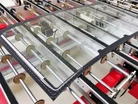Saint-Gobain and Corning team up to create advanced automotive glass technologies

Saint-Gobain and Corning Incorporated have announced a new joint venture to produce lightweight glazing for the automotive industry.
Saint-Gobain is the world leader in the habitat and construction market, designing, manufacturing, and distributing high-performance and building materials, and Corning is one of the global innovators in materials science, concentrating for the past 160 years on speciality glass, ceramics, and optical physics. These two businesses combining their expertise is expected to significantly further automotive manufacturers’ development of ‘the car of the future’.
The venture will be equally-owned, and focussed on developing, manufacturing, and selling lightweight glazing solutions. Laminated windows made with ultra-thin Corning Gorilla Glass for automotive glass and window technologies offer an improved combination of lightness, toughness, and optical quality over traditional solutions. This specialist glass can be used for all laminated windows within the vehicle and will reduce weight, which improves fuel efficiency, environmental impact, and handling.
It is expected that new manufacturing facilities will need to be built in order to meet demand.
Houchan Shoeibi, President of Saint-Gobain Sekurit, said: “By combining the know-how of Saint-Gobain, a world leader in developing and processing automotive glass, with Corning’s innovative Gorilla Glass technology, the joint venture will provide the opportunity to create a major innovation in one of Saint-Gobain’s historical businesses.”

